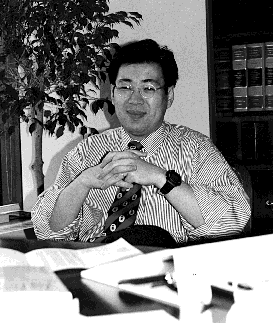GOLDSEA | ASIAMS.NET | ASIAN AMERICAN PERSONALITIES
BIOTECH GOLDENBOY
PAGE 9 OF 12
| "The technical [factor] is only a part of the [reason for the] failure of a compound or a project." |
Kuo's star rose quickly. After a year with the Castle Group he accepted the managing directorship of HealthCare Investment Corporation's $380 million venture fund whose portfolio, at that time, contained 30 biotech startups. That essentially placed Kuo in charge of deciding which projects would receive how much funding.
"It's really the top biotech venture capital firm in the country," Kuo says. "It was an incredible position and I went for it with Lindsay's blessing."
During his three years at HealthCare Kuo was responsible for helping to launch several high-flyers. One was Genetic Therapy Inc, the first and leading gene therapy company for which Sandoz Pharmaceuticals later paid $300 million. Another was Human Genome Sciences to which under Kuo's direction, HealthCare committed $85 million. Today the publicly traded company is valued at $800 million.
"It started the race to map the entire human genome," Kuo says with some pride. "I was involved from day one." He attended HGS board meetings and personally wrote the business plan which eventually became the prospectus for a hugely successful IPO.
"That company grew from one employee when I started to probably a hundred when I left. That was within a one-year time frame. They're now about 250 employees and they've just [completed raising] another $120 million."
The skills Kuo drew on were a combination of science and business.
"People ask why don't you just hire a guy from the university who's expert in the field to evaluate things," Kuo explains, "but the technical [factor] is only a part of the [reason for the] failure of a compound or a project. There's things like regulatory risks.
"The technical part involves [issues like] the stage of development, the amount of competition, which other companies are developing similar drugs and the expense of clinical trials. Some are far more expensive. Hypertension is probably one of the most expensive to run. You have to balance that out against the investment that's going into that project. It's a multi-dimensional analysis."

Typically a promising biotech startup is funded with about $2-3 million. The investment grows to about $15 million before a company is ready for an initial public offering, the stage at which investors can start realizing a return on their investment. That point usually comes five or more years after launch.
In May of 1995 a headhunter called Kuo to interest him in heading up the cardiovascular area of Pfizer's licensing division. Happy with his position at HealthCare and seeing little potential for excitement in working for what he saw as a stodgy old-line pharmaceutical giant that did little licensing of outside technologies, Kuo declined. What finally persuaded him to meet with Pfizer was its sheer size and importance in the drug world, which made it likely that he would likely do business with it at some time in his life.
During the first meeting at Pfizer Kuo was impressed by its $1.5 billion research and licensing budget, the biggest in the pharmaceutical industry. It was clear the giant was aggressively growing its capabilities for licensing interesting technologies from around the world.
"They said, 'We're changing and we're being very aggressive. We have a lot of money to do it and we're looking for young guys like you'," Kuo recalls. "I decided to go. I thought it would enhance my contacts in the international pharmaceutical community of which I really had none because most of my ventures at HealthCare was dealing with scientists in the U.S. I didn't have very many contacts with companies in Europe and Japan. Also it would increase my knowledge of the pharmaceutical industry because my background is in molecular biology and not pharmaceuticals." PAGE 10
|Page 1 | 2 | 3 | 4 | 5 | 6 | 7 | 8 | 9 | 10 | 11 | 12 |
CONTACT US
|
ADVERTISING INFO
© 1996-2013 Asian Media Group Inc
No part of the contents of this site may be reproduced without prior written permission.
